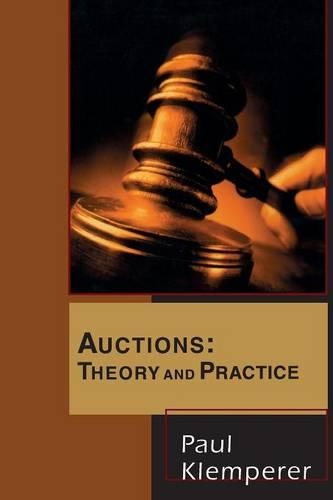
Auctions: Theory and Practice
(Paperback)
Publishing Details
Auctions: Theory and Practice
By (Author) Paul Klemperer
Princeton University Press
Princeton University Press
8th June 2004
United States
Classifications
Professional and Scholarly
Non Fiction
Economics
381.17
Physical Properties
Paperback
264
Width 152mm, Height 235mm
369g
Description
Governments use them to sell everything from oilfields to pollution permits, and to privatize companies; consumers rely on them to buy baseball tickets and hotel rooms, and economic theorists employ them to explain booms and busts. Auctions make up many of the world's most important markets; and this book describes how auction theory has also become an invaluable tool for understanding economics. Auctions: Theory and Practice provides a non-technical introduction to auction theory, and emphasises its practical application. Although there are many extremely successful auction markets, there have also been some notable fiascos, and Klemperer provides many examples. He discusses the successes and failures of the one-hundred-billion dollar "third-generation" mobile-phone license auctions; he, jointly with Ken Binmore, designed the first of these. Klemperer also demonstrates the surprising power of auction theory to explain seemingly unconnected issues such as the intensity of different forms of industrial competition, the costs of litigation, and even stock trading 'frenzies' and financial crashes.Engagingly written, the book makes the subject exciting not only to economics students but to anyone interested in auctions and their role in economics.
Reviews
"As a leader in auction-theory research and as a leading practitioner of auction design, Paul Klemperer is the best person to write the definitive book on auctions in theory and practice. This book ties together material on what economists should learn from auction theory, and on what auction theorists should learn from practical experience in auction design." - Roger B. Myerson, University of Chicago; "Paul Klemperer is one of the leaders in auction design worldwide. His emphasis in recent years on some of the more practical aspects of the theory - how to attract bidders, how to avoid collusion, how to think about government policy goals in designing public auctions - is particularly innovative. Klemperer's work will be very influential in the coming years." - Jeremy Myorson, Stanford University"
Author Bio
Paul Klemperer is the Edgeworth Professor of Economics at Oxford University and a Fellow of the British Academy and of the Econometric Society.
